One of the notorious talking points used by inveterate objectors to design theory, is that it is about stealth creationism. Closely tied, is the suggestion (or, assumption) that the claim that design inference on empirical sign only warrants inference to design as process is a dishonest stalking horse.
Given a long saddening track record of career and hobbyist objectors, unsurprisingly, that is false.
A simple case — and “case” is itself significant — easily shows why. About seven years ago, one night, fires broke out in two of Montserrat’s court houses, and did considerable damage (including to records).
After they were put out, investigators found signs of accelerants. For cause, they inferred arson. However, they were unable to infer onward to credibly suspected arsonists. Why? Want of a cluster of facts and logic, never mind that popular suspicion did attach to persons believed to benefit from loss of records. As any lawyer can tell, motive, means, opportunity backed up by evidence are the foundation stones on which a court reaches sound judgement. (Kangaroo courts do exist, but leaping to a predetermined conclusion without fair process is not sound process.)
In short, the design inference is much like the progress of investigation of an event: are mechanical necessity and/or chance adequate to explain, or is intentionally, intelligently directed configuration a more credible explanation, given signs s1, s2 . . . sn?
Let’s elaborate, using the per aspect design explanatory filter flowchart:
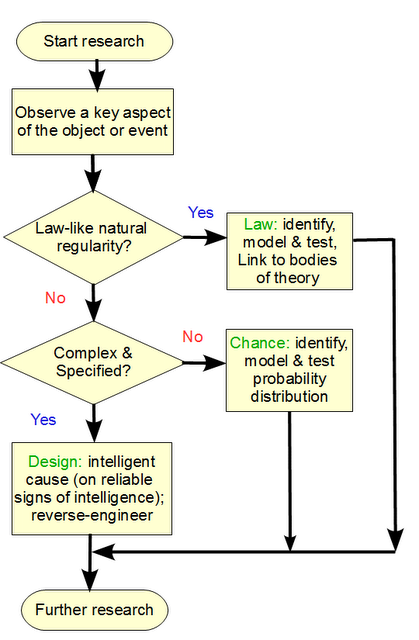
We see here, that proof — or, warrant — of design as credible causal process is a case of showing warrant beyond reasonable doubt, with TWO defaults that point elsewhere: chance and/or mechanical necessity. That is, some combination of mechanical and/or stochastic laws acting on a plausible initial condition of a relevant substrate. That is, we here first consider the action of a dynamic-stochastic system, driven by forces and factors amenable to analysis on differential and/or difference equations with potential stochastic components. (And no, this is not “reification” of chance, we here appeal to things such as the random behaviour of molecules or the like.)
Illustrating, to refresh our memories:
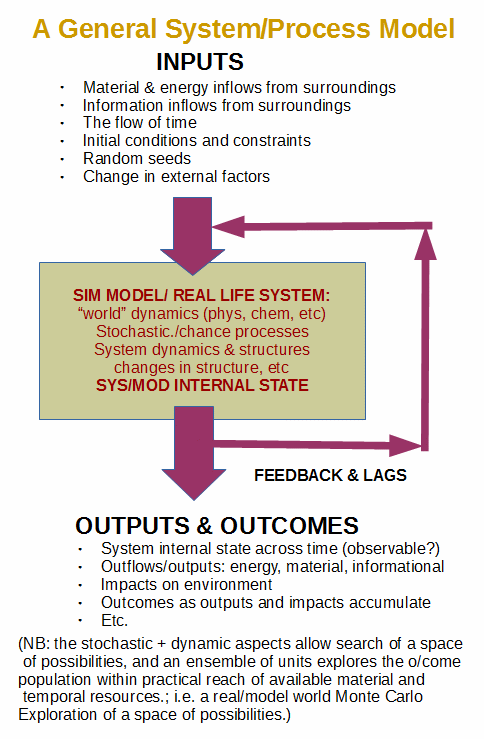
Yes, it is when an explanatory model like this (up to and including conditions on our planet leading up to Darwin’s pond or the like, or whatever antecedents to the observed cosmos are suggested as leading up to the big bang singularity) FAILS, that design as process is on the table. Where, the ontological distance between design and designer is the same as between arson and credibly convicted arsonists.
Let’s add on the linked needle in haystack, islands of function, hill climbing challenges that are too often overlooked:
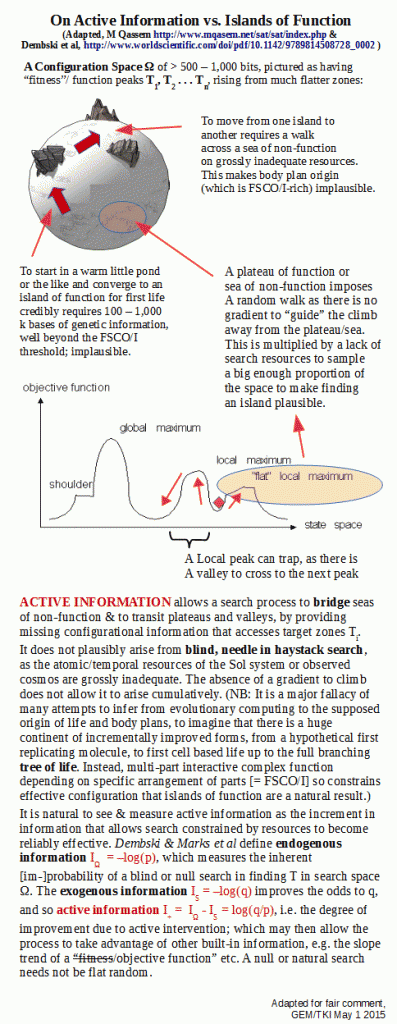
But, we are going somewhere with this, a case study on identifying a culprit.
Case in point, consider the text of this post, and by extension, that of the Internet, Libraries etc. We here have functionally specific organisation, manifesting associated information. FSCO/I for short, well beyond the 500 – 1,000 bit threshold that points to overwhelming needle in haystack challenge:
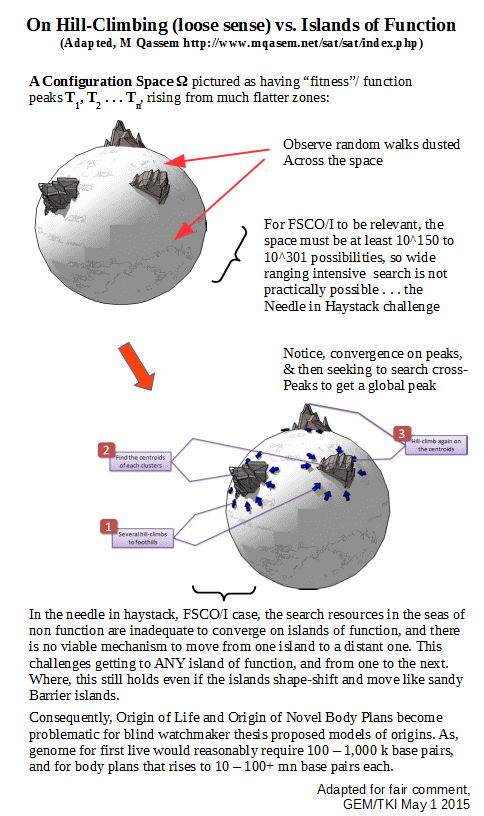
Reppert, has a key point; let’s refresh our memories yet again . . . it needs to sink in:
. . . let us suppose that brain state A [–> notice, state of a wetware, electrochemically operated computational substrate], which is token identical to the thought that all men are mortal, and brain state B, which is token identical to the thought that Socrates is a man, together cause the belief [–> concious, perceptual state or disposition] that Socrates is mortal. It isn’t enough for rational inference that these events be those beliefs, it is also necessary that the causal transaction be in virtue of the content of those thoughts . . . [But] if naturalism is true, then the propositional content is irrelevant to the causal transaction that produces the conclusion, and [so] we do not have a case of rational inference. In rational inference, as Lewis puts it, one thought causes another thought not by being, but by being seen to be, the ground for it. But causal transactions in the brain occur in virtue of the brain’s being in a particular type of state that is relevant to physical causal transactions.
Rationality requires this sort of freely arrived at inference, and is a sign in itself. That is, a blindly mechanical, dynamic-stochastic, composite computational substrate based on organised interactions of constituent parts — see the model summary above — cannot adequately explain designs. We are now in logic of being territory (which is a branch of metaphysics, literally beyond [the study of] physics . . nature), and the extended Smith Model is now on the table:
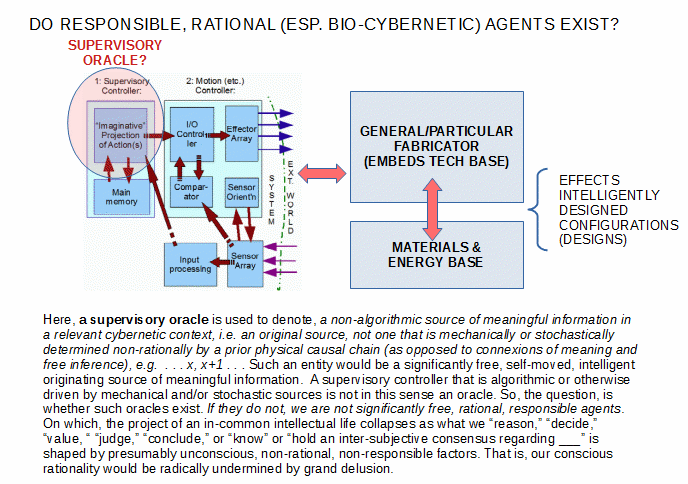
Yes, the prime suspect for designs emanating from certain familiar bio-cybernetic entities is a non-computational, non-algorithmic, supervisory oracle. A mind, in short.
Where, 2360 years ago, Plato pointed to such in his The Laws, Bk X:
Cle. . . . I should like to know how this happens.
Ath. I fear that the argument may seem singular.
Cle. Do not hesitate, Stranger; I see that you are afraid of such a discussion carrying you beyond the limits of legislation. But if there be no other way of showing our agreement in the belief that there are Gods, of whom the law is said now to approve, let us take this way, my good sir.Ath. Then I suppose that I must repeat the singular argument of those who manufacture the soul according to their own impious notions; they affirm that which is the first cause of the generation and destruction of all things, to be not first, but last, and that which is last to be first, and hence they have fallen into error about the true nature of the Gods.
Cle. Still I do not understand you.
Ath. Nearly all of them, my friends, seem to be ignorant of the nature and power of the soul [[ = psuche], especially in what relates to her origin: they do not know that she is among the first of things, and before all bodies, and is the chief author of their changes and transpositions. And if this is true, and if the soul is older than the body, must not the things which are of the soul’s kindred be of necessity prior to those which appertain to the body?
Cle. Certainly.
Ath. Then thought and attention and mind and art and law will be prior to that which is hard and soft and heavy and light; and the great and primitive works and actions will be works of art; they will be the first, and after them will come nature and works of nature, which however is a wrong term for men to apply to them; these will follow, and will be under the government of art and mind.
Cle. But why is the word “nature” wrong?
Ath. Because those who use the term mean to say that nature is the first creative power; but if the soul turn out to be the primeval element, and not fire or air, then in the truest sense and beyond other things the soul may be said to exist by nature; and this would be true if you proved that the soul is older than the body, but not otherwise.
[[ . . . .]Ath. . . . when one thing changes another, and that another, of such will there be any primary changing element? How can a thing which is moved by another ever be the beginning of change? Impossible. But when the self-moved changes other, and that again other, and thus thousands upon tens of thousands of bodies are set in motion, must not the beginning of all this motion be the change of the self-moving principle? . . . . self-motion being the origin of all motions, and the first which arises among things at rest as well as among things in motion, is the eldest and mightiest principle of change, and that which is changed by another and yet moves other is second.
[[ . . . .]Ath. If we were to see this power existing in any earthy, watery, or fiery substance, simple or compound-how should we describe it?
Cle. You mean to ask whether we should call such a self-moving power life?
Ath. I do.
Cle. Certainly we should.
Ath. And when we see soul in anything, must we not do the same-must we not admit that this is life?
[[ . . . . ]Cle. You mean to say that the essence which is defined as the self-moved is the same with that which has the name soul?
Ath. Yes; and if this is true, do we still maintain that there is anything wanting in the proof that the soul is the first origin and moving power of all that is, or has become, or will be, and their contraries, when she has been clearly shown to be the source of change and motion in all things?
Cle. Certainly not; the soul as being the source of motion, has been most satisfactorily shown to be the oldest of all things.
Ath. And is not that motion which is produced in another, by reason of another, but never has any self-moving power at all, being in truth the change of an inanimate body, to be reckoned second, or by any lower number which you may prefer?
Cle. Exactly.
Ath. Then we are right, and speak the most perfect and absolute truth, when we say that the soul is prior to the body, and that the body is second and comes afterwards, and is born to obey the soul, which is the ruler?
[[ . . . . ]Ath. If, my friend, we say that the whole path and movement of heaven, and of all that is therein, is by nature akin to the movement and revolution and calculation of mind, and proceeds by kindred laws, then, as is plain, we must say that the best soul takes care of the world and guides it along the good path. [[Plato here explicitly sets up an inference to design (by a good soul) from the intelligible order of the cosmos.]
In short, rationality required for design raises serious ontological issues. Accordingly, inference from design/arson to designer/arsonist is an ontologically laden exercise. We may empirically acknowledge the reality of designers, but once we ponder what enables ability to design, we are in logic of being territory.
Immediately, this shows the fundamental error in the notion that on evidence of signs of design we are only warranted to infer to human or human-like embodied designers. For, the rational roots of design point to our being mind over matter amphibians, bio-cybernetic entities with supervisory oracles that simply don’t work in the way dynamic-stochastic computational substrates do.
Those who imagine that such designs cannot influence a closed mechanistic-stochastic world, are similarly invited to ponder: why, apart from question-begging a priori imposition of evolutionary materialistic scientism or its fellow travellers, do you think this?
Doesn’t the Casimir effect already point to observable quantum field influences that are below the limits of Energy-Time uncertainty relations?
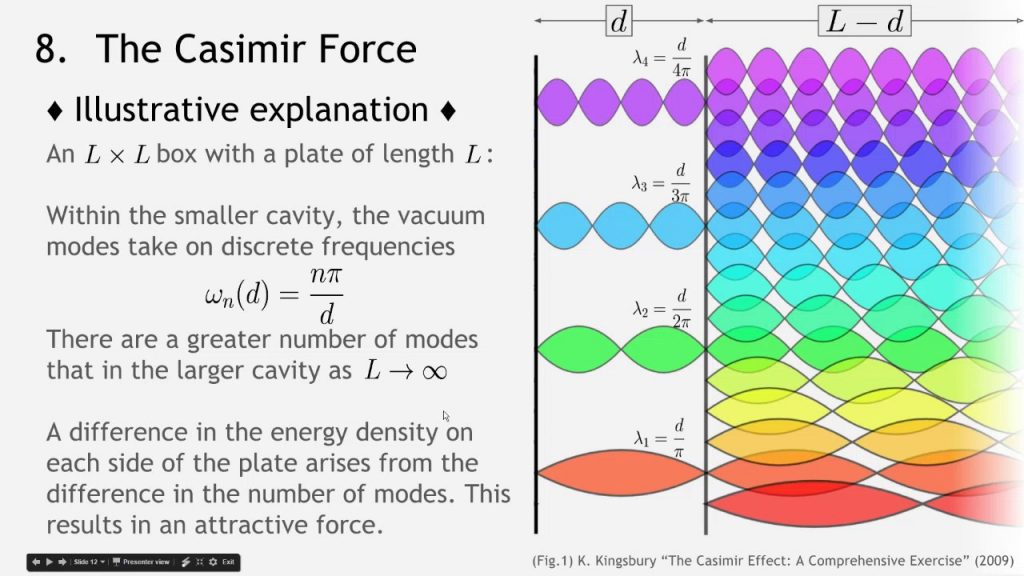
So, why is it dismissed that we may have quantum-level influences on the brain etc as I/O in-the-loop controller? That’s why Scott Calef argued:
Keith Campbell writes, “The indeterminacy of quantum laws means that any one of a range of outcomes of atomic events in the brain is equally compatible with known physical laws. And differences on the quantum scale can accumulate into very great differences in overall brain condition. So there is some room for spiritual activity even within the limits set by physical law. There could be, without violation of physical law, a general spiritual constraint upon what occurs inside the head.” (p.54). Mind could act upon physical processes by “affecting their course but not breaking in upon them.” (p.54). If this is true, the dualist could maintain the conservation principle but deny a fluctuation in energy because the mind serves to “guide” or control neural events by choosing one set of quantum outcomes rather than another. Further, it should be remembered that the conservation of energy is designed around material interaction; it is mute on how mind might interact with matter. After all, a Cartesian rationalist might insist, if God exists we surely wouldn’t say that He couldn’t do miracles just because that would violate the first law of thermodynamics, would we? [Article, “Dualism and Mind,” Internet Encyclopedia of Philosophy.]
Similarly, let us ponder Penrose and Hameroff:
It is argued that elementary acts of consciousness are non-algorithmic, i.e., non-computable, and they are neurophysiologically realized as gravitation-induced reductions of coherent superposition states in microtubuli . . . . Penrose’s rationale for invoking state reduction is not that the corresponding randomness offers room for mental causation to become efficacious (although this is not excluded). His conceptual starting point, at length developed in two books (Penrose 1989, 1994), is that elementary conscious acts must be non-algorithmic. Phrased differently, the emergence of a conscious act is a process which cannot be described algorithmically, hence cannot be computed. His background in this respect has a lot to do with the nature of creativity, mathematical insight, Gödel’s incompleteness theorem, and the idea of a Platonic reality beyond mind and matter . . . . With his background as an anaesthesiologist, Hameroff suggested to consider microtubules as an option for where reductions of quantum states can take place in an effective way, see e.g., Hameroff and Penrose (1996). The respective quantum states are assumed to be coherent superpositions of tubulin states, ultimately extending over many neurons. Their simultaneous gravitation-induced collapse is interpreted as an individual elementary act of consciousness. The proposed mechanism by which such superpositions are established includes a number of involved details that remain to be confirmed or disproven.
Maybe, the time has come for some serious re-thinking. For, we have the freedom to think. END